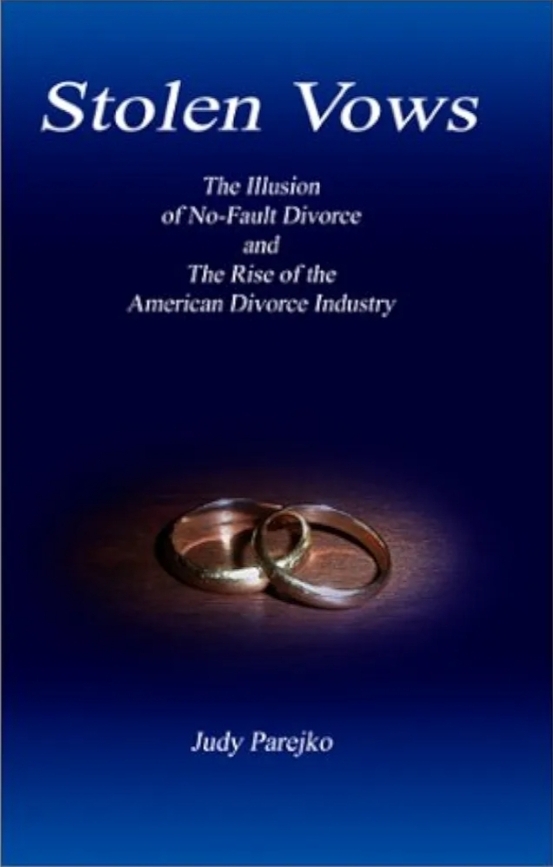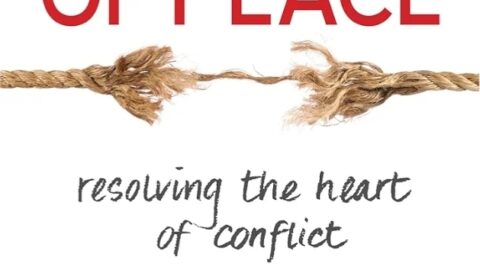Judy Parejko’s Stolen Vows: The Illusion of No-Fault Divorce and the Rise of the American Divorce Industry offers a critical examination of the no-fault divorce system in the United States and its impact on families and society. The book explores how no-fault divorce laws, which allow for the dissolution of marriage without assigning blame to either party, have contributed to the breakdown of family structures, changed the cultural meaning of marriage, and fueled the growth of the divorce industry.
Key Themes and Concepts:
History and Origins of No-Fault Divorce:
- Parejko traces the origins of no-fault divorce to the late 1960s and early 1970s, particularly focusing on California’s 1969 law as the first to enact no-fault divorce. This legal shift allowed couples to divorce without proving wrongdoing such as infidelity or abuse.
- The author argues that the move toward no-fault divorce was framed as a progressive step toward personal freedom and autonomy, but it had unintended negative consequences for families and society at large.
The Illusion of Freedom in No-Fault Divorce:
- One of the central arguments in Stolen Vows is that no-fault divorce creates the illusion of freedom for individuals seeking to end a marriage. Parejko contends that, while it ostensibly simplifies the process of divorce, it often leaves one spouse—usually the one who does not want the divorce—powerless to prevent the breakup of the family.
- The book challenges the idea that no-fault divorce represents a fair and balanced system, instead arguing that it disproportionately benefits the spouse who wishes to leave the marriage, often at the expense of the other spouse and the children involved.
Impact on Marriage and Commitment:
- Parejko discusses how no-fault divorce has eroded the cultural understanding of marriage as a lifelong commitment. She argues that the ease with which marriages can be dissolved under no-fault laws has led to a devaluation of the institution of marriage itself.
- The book explores the notion that marriage, once considered a binding contract with legal and moral obligations, has been reduced to a temporary arrangement that can be ended at any time for any reason. This shift, Parejko argues, has weakened the stability of families and created a culture of disposability in relationships.
The Divorce Industry:
- A major focus of the book is on the rise of the divorce industry, which Parejko describes as a network of lawyers, mediators, therapists, and other professionals who profit from the dissolution of marriages. She argues that the no-fault divorce system has fueled the growth of this industry, turning divorce into a profitable enterprise.
- Parejko is critical of the role that the legal system plays in facilitating divorce, suggesting that it incentivizes conflict and division rather than reconciliation and healing. She also critiques the financial motives behind the divorce industry, which she believes exploits vulnerable individuals during a difficult and emotionally charged time in their lives.
Children as Victims of No-Fault Divorce:
- One of the key concerns Parejko raises is the impact of no-fault divorce on children. She argues that children are often the silent victims of divorce, suffering emotional and psychological harm as a result of the breakup of their family.
- The book highlights research that shows the long-term negative effects of divorce on children, including increased rates of anxiety, depression, academic struggles, and difficulties forming healthy relationships in adulthood. Parejko believes that the no-fault divorce system fails to adequately consider the welfare of children, focusing instead on the desires of the divorcing adults.
Legal and Moral Critiques:
- Parejko offers both legal and moral critiques of the no-fault divorce system. Legally, she argues that the system undermines the contractual nature of marriage by allowing one party to unilaterally dissolve the marriage without cause, regardless of the wishes of the other party.
- Morally, Parejko contends that no-fault divorce undermines personal responsibility and commitment, allowing individuals to escape the consequences of their actions without facing accountability. She believes that the system promotes selfishness and disregard for the well-being of others, particularly children and the spouse who may not want the divorce.
Societal Consequences of No-Fault Divorce:
- The book examines the broader societal consequences of no-fault divorce, arguing that the system has contributed to the breakdown of the traditional family structure, increased rates of single-parent households, and greater financial and emotional instability for many individuals.
- Parejko also discusses the economic impact of divorce, noting that divorce often leaves women and children in more precarious financial situations, while the divorce industry continues to profit from their misfortune.
Call for Reform:
- Throughout Stolen Vows, Parejko advocates for reform of the no-fault divorce system. She suggests that there should be more legal protections for the spouse who wishes to remain in the marriage, as well as greater consideration of the impact of divorce on children.
- The book calls for a return to a more balanced approach to divorce, where the decision to end a marriage is treated with greater gravity and where both parties must take responsibility for their actions.
Personal Stories and Case Studies:
- Parejko includes personal stories and case studies throughout the book to illustrate the real-life impact of no-fault divorce. These stories highlight the emotional and financial devastation experienced by individuals who were left by their spouses, often without any opportunity to repair the relationship.
- These narratives serve to underscore Parejko’s argument that no-fault divorce is not a fair or just system, but one that often leaves one party deeply hurt and disadvantaged.
Cultural Shifts and the Future of Marriage:
- In the final chapters, Parejko discusses the cultural shifts that have accompanied the rise of no-fault divorce and reflects on the future of marriage in American society. She expresses concern that marriage is becoming increasingly devalued and that future generations may view it as an optional or temporary arrangement rather than a lifelong commitment.
- Parejko concludes by calling for a renewed focus on the importance of marriage as the foundation of a stable and healthy society, and for legal reforms that prioritize the well-being of families and children.
Stolen Vows by Judy Parejko offers a powerful critique of the no-fault divorce system and its impact on American families. Through legal analysis, personal stories, and a focus on the cultural and societal consequences of divorce, Parejko argues that no-fault divorce has undermined the institution of marriage, harmed children, and fueled the growth of a profit-driven divorce industry. The book advocates for reform of the divorce system and a renewed emphasis on the value of marriage and personal responsibility.







